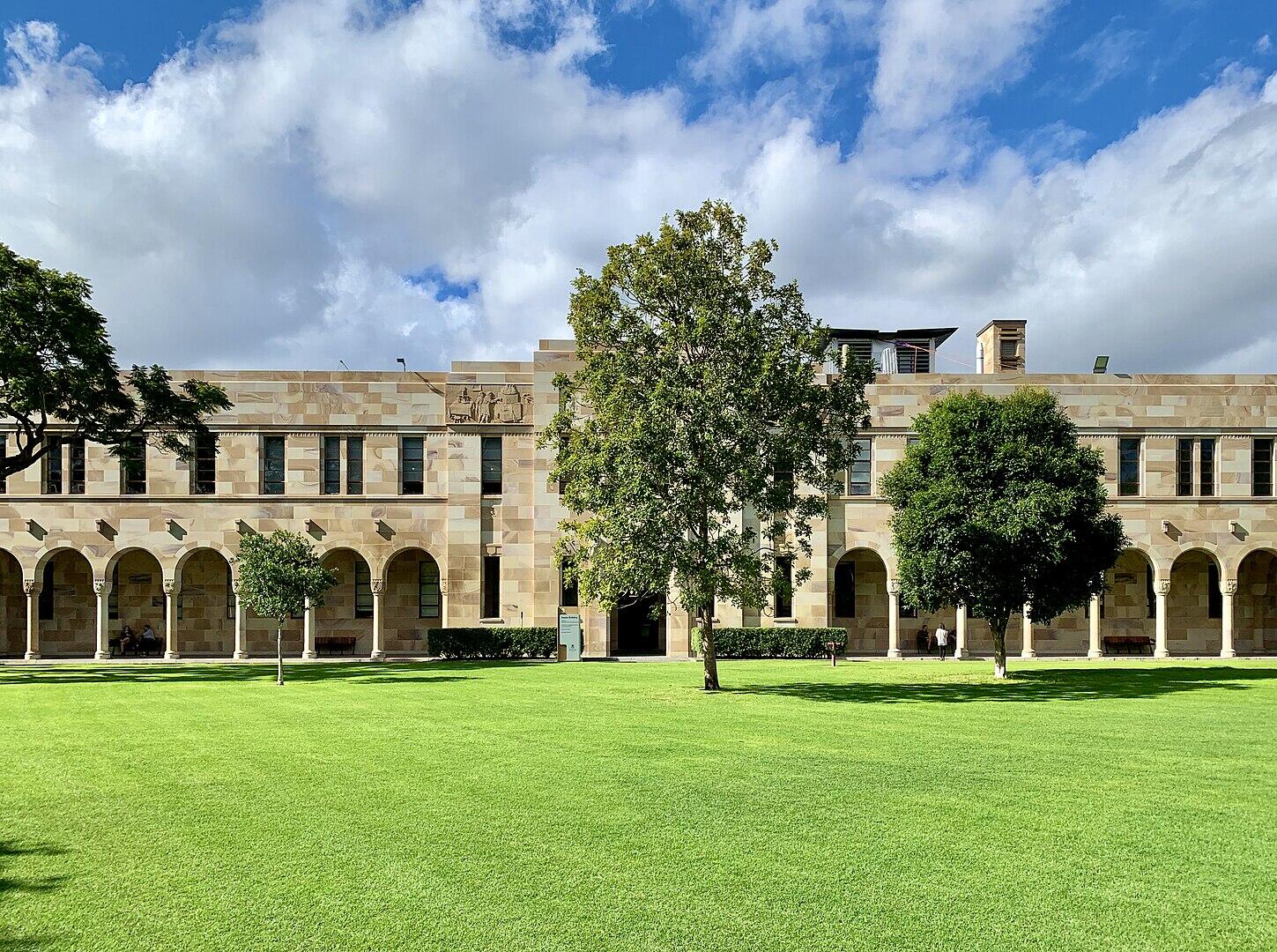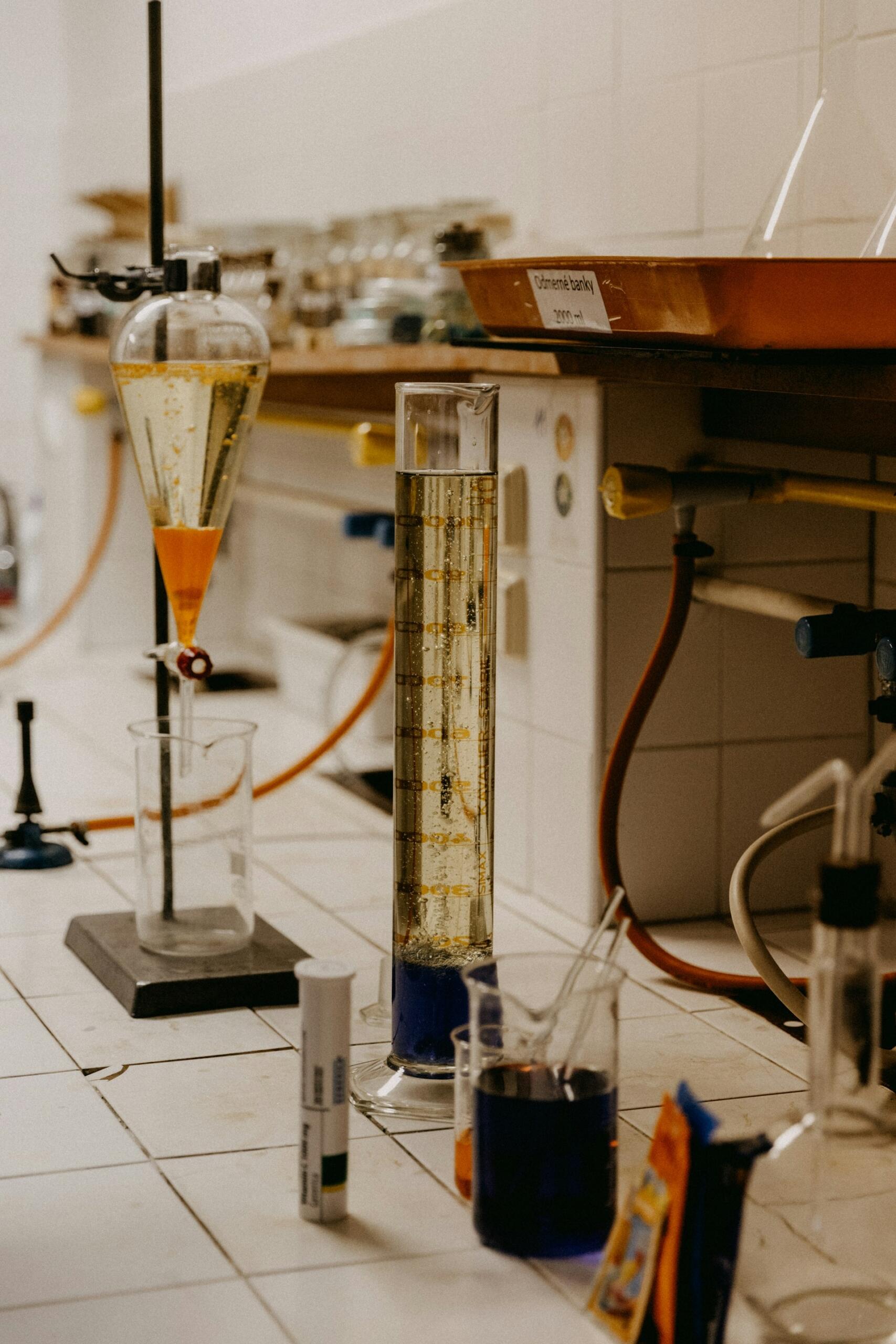Chemistry is considered an enabling science because its study builds the foundation for understanding, and advancing, other scientific disciplines. Hands-down, the University of Queensland (UQ) offers the most extensive list of chemistry courses. However, other Australian universities offer quality programs, too.

What is the Study of Chemistry?

Chemistry is (nearly) everything. Humans are walking stews of chemistry, and woe betide us if our chemical balance is disturbed. Our environment, and individual ecosystems, depend on their chemical structures. Even our foods are no more than chemical compositions.
From that perspective, the study of chemistry must be overwhelming. But, once we reduce this far-reaching science to its fundamentals, we find chemistry concepts easy to grasp.
Once learners grasp chemistry fundamentals, they can build on that knowledge to master more advanced science disciplines.
We've two ways of looking at chemistry studies. From one perspective, a chemistry degree can open doors to stable careers, as you'll see in this article's last chapter. On the other side of that equation, studying chemistry paves the way to innovation and discovery.
What Do You Learn in Chemistry?
Chemistry studies revolve around matter and its properties. Students (and scientists) observe and record the interactions between different substances, and their impacts. They apply this knowledge to specific fields, including biochemistry, environmental science, and even medical studies.
In a few instances, chemistry studies take a narrow focus. For instance, food science and technology degrees begin with chemistry, before moving into broader areas related to food. Those include social, and technical aspects of food preparation.
Chemistry courses aren't just about the Periodic Table, mathematics, and formulae. They're pathways into secure careers, noble excursions to remedy harm, and lifesaving innovations. And, they're far more engaging than you might suspect.

Chemistry Courses in Australia
By any measure, the University of Queensland is the best university for chemistry studies in Australia. According to the university ranking site EduRank, UQ takes the #1 spot for seven chemistry-related fields:
- Biochemical engineering
- Food science and nutrition
- Radiochemistry
- Physical chemistry
- Organic chemistry
- Environmental chemistry
UQ's Chemical engineering degree programs, the school's seventh top chemistry study area, is particularly noteworthy. Chemical engineering is a broad field, so UQ offers specialised programs tailored to its many pathways.
Median Australian Tertiary Admissions Rank (ATAR) 91 (with adjustments)
International Baccalaureate (IB) 28.75 (minimum)
Prerequisites: General English, Mathematical Methods (or equivalent), at least one science International student requirements: proof of English ability (TOEFL, IELTS), Maths and Science courses equal to Australian requirements.
The University of Sydney Chemistry Studies
This university ranks 3rd in Australia, and 80th in the world for chemistry studies. During your three years of study here, you'll choose a major field of study that corresponds to your learning and career goals.
The University of Sydney highlights the difference between their Biology and Chemistry study plans, both of which fall under their Bachelor of Science offering. Like UQ, this university uses the major/minor system to ensure their students have access to the courses that will satisfy their educational goals.
Minimum 80 ATAR (+ adjustments)
Prerequisites: Mathematics and Advanced Mathematics
International students: qualifications commensurate with Australian students' requirements
Bachelor of Science Degree Monash University
This school is 4th in Australia, and 107th in the world for Chemistry studies, according to EduRank. It does not claim first place in any chemistry sub-discipline. However, it ranks #2 for inorganic chemistry, biochemical engineering, and pharmacy studies in Australia.
Chemistry learning at Monash is hands-on. Students take field trips to science centres that work within their major field. They have access to state-of-the-art laboratory facilities, and access to experts in their study fields. Lectures, workshops, and research projects all flesh out the chemistry curriculum at Monash.
ATAR 82 (lowest offer 2025)
Prerequisites: Science(s), English
International students' requirements: Science or Maths; English (IELTS, TOEFL or other exam)
Australia boasts 44 public universities, all of which offer Bachelor of Chemistry pathways. These three schools consistently rank at the top for their facilities, quality learning, student satisfaction. But, you're not limited to just these choices. These top Australian universities also deliver excellent chemistry programs.
| 🏫School name | 📍Location | 👩🎓Available programs | ⌚Part-time available? | 🎓Honours programs? | 📅Course duration |
|---|---|---|---|---|---|
| University of Queensland | Queensland | 1 | Yes | Yes | 3 years, or part-time equivalent |
| University of Melbourne | Victoria | 4 | Yes | Yes | 3 years, or part-time equivalent |
| University of Sydney | NSW | 1 | Yes | No | 3 years, or part-time equivalent |
| Monash University | Victoria | 2 | Yes | Yes | 3 years, or part-time equivalent |
| University of New South Wales | NSW | 2 | No | Yes | 3 years, or 4 for hons. |
| Australian National University | ACT | 2 | No | Yes | 3 years, or 4 for hons. |
| University of Adelaide | South Australia | 2 | Yes | Yes | 3 years, or 4 for hons. |
| University of Western Australia | Western Australia | 2 | No | Yes | 3 years |
| University of Wollongong | NSW | 1 | No | No | 3 years |
| Curtin University | Western Australia | 1 | No | No | 3 years |

What Do You Learn in Chemistry?
The list of chemistry degrees in the table above does not reflect the course combinations students might select. Typically, those schools encourage applicants to pair a major course of study - chemistry, with a minor in some other subject.
As mentioned at the start of this article, chemistry is an enabling science. A century ago, chemistry was a discipline in itself but, today, it has fractured into dozens of sub-specialities.

Still, we found a central breakdown across all the chemistry degree courses we examined.
Organic chemistry career paths
- pharmaceuticals
- plastics manufacture
- soap/detergent formulation
- medicine
Inorganic chemistry career paths
- electronics industry
- agricultural concerns
- energy conversion operations
- environmental science
General chemistry
- foundational information
- covers basic theories and principles
- paves the way to specialisation
Physical chemistry
- studies chemistry through a physics lens
- primarily targeted at research domains
All chemistry courses in Australia follow some version of this breakdown. They might place greater emphasis on one or the other aspect, depending on its global standing, reputation, and research facilities.
For instance, the University of New South Wales ranks #1 in the country for inorganic chemistry studies. This school has the facilities, and the specialists, to create and sustain their world-class program in this sub-field. Nevertheless, this arrangement prepares you for all aspects of further chemistry studies, and a few career fields.
Choose your chemistry degree plan to according to the study programs they offer.
Apply to the one(s) that match your learning and career goals.
Chemistry Degree Admissions Requirements

As chemistry courses are a gateway to - an enabler of, specific degree plans, the bar for entry to Bachelor of Science (chemistry) programs is fairly low. UQ, our top university for this science, sets the minimum ATAR at 80. Monash, the #5 school, guarantees entry with a 73 ATAR.
However, all the schools we reviewed were firm in their prerequisites and assumed knowledge demands. These criteria vary from one school to the next. But, they all contain the same elements.
Domestic student requirements
- mid-70s to 80s ATAR
- Maths and Advanced Maths
- Science(s)
- English
International student requirements
- IB 27 - 29
- Mathematics
- Science(s)
- English
Note that Monash University does not require domestic or international applicants to present Maths prior learning results. However, UQ, the University of Sydney, and most others on our list do.
Likewise, students aiming for select science degree plans, such as forensic chemistry or food science, have no prerequisites to meet. On the other hand, candidates for environmental science studies have a long list of required knowledge to demonstrate.
Looking for chemistry tutors for reinforcement? Superprof is a platform that allows chemistry students to find local tutors quickly. Visit Superprof, type in "lessons in chemistry review" and you will have access to a long catalogue of local chemistry tutors ready to start lessons with you.
The lack of standard requirements, across schools and degree plans, makes it hard for students to estimate their chances at the courses they want.
You have two ways around this matter. The first is tracking your desired degree program, offered at your first-choice schools.
The second is to continue being the excellent learner that you are. As long as your marks are the best you can earn, you should have no worries about landing the degree plan you aim for.
Study Chemistry for a Solid Career
While still a child, John Cornforth received a diagnosis of otosclerosis, which would ultimately cost him his hearing. By then, he'd already set his sights on a career in law, which he had to abandon. Chemistry was not his first love - or any love, but he found the field enticing. Mainly because he noted flaws in the scientific literature.
Completely deaf by the time he was 20, student Cornforth enrolled in the University of Sydney's chemistry studies program. He had to move to England to continue his organic chemistry studies, as Australia had no Chemistry PhD programs at that time.
At Oxford, he contributed significantly to the research and development of penicillin. Not content with that major accomplishment, he continued his research, into other aspects of chemical knowledge.
To date, Sir Cornforth is the only Nobel Laureate from New South Wales. As a chemistry studies undergraduate, you might make it your goal to challenge that venerable scientist's record. Or, you can make your mark in any of these career fields:
- analytical chemistry
- researcher
- geochemist
- laboratory technician/assistant
- research project technician
- toxicologist
- chemical engineering
- pharmacy/pharmacology
- agrochemicals consultant
- environmental chemist
- government policy adviser
- science educator
You might also choose a targeted field in chemistry education, such as chemical engineering or forensic chemistry studies. This degree plan pairs chemistry knowledge with police work to help solve crimes.
By contrast, a chemical engineering degree is broad enough to give you a broad selection of career paths. You might work in the petroleum industry, or specialise in developing chemistry-related manufacturing and processing systems. In all cases, earning your Bachelor of Science in Chemistry prepares you for a rewarding career.
If you'd like to know more or be more prepared for your Bachelor's degree in Chemistry, visit Superprof and find a chemistry tutor online who can help you reinforce and improve your knowledge of chemistry. Superprof helps you connect with both local and online tutoring. If you live in Canberra, for example, all you need to do is type in "chemistry tutor canberra," followed by "Superprof" on your browser and you'll find the Superprof platform with thousands of tutors all over the country. Visit Superprof and find the chemistry lessons you are looking for today!
Summarise with AI:















